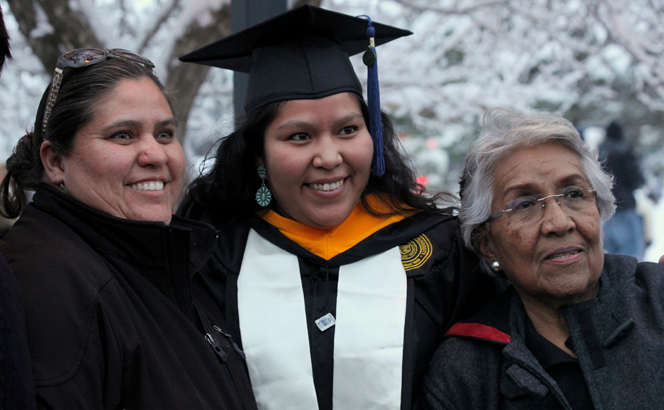Northern Arizona University’s Educational Support Services recently earned a statewide honor for its remarkable strides toward helping Native American students gain access to higher education degrees.
The Pathways to Postsecondary Education Award recognizes the success of NAU’s college access programs and the increase in proportional representation of Native American students receiving bachelor’s degrees.
Erin Grisham, the executive director of Educational Support Services, was singled out in the award announcement for her significant contribution to the field, including playing a key role on statewide college access and financial aid task forces and for providing leadership in the development and launch of the Northern Arizona College Resource Center.
Grisham, who is in her 16th year with the university, said NAU’s access programs have been on campus since 1985 and provide services to more than 3,000 students and their families each year.
“NAU is one of a very few colleges and universities nationally that have five TRIO programs,” Grisham said. “We have a long and sustained commitment to college access and I believe this recognition is a testament to that commitment. Our staff is truly committed to providing access and opportunity for these students.”
Ten programs are housed under Educational Support Services, including five federally funded TRIO programs that serve low-income and first-generation students and individuals with disabilities. Educational Support Services assists returning and nontraditional students and reaches into junior high and high schools across the state, many of which are located in rural areas.
NAU’s TRIO programs includes the Four Corners Upward Bound Math and Science program, a year-round academic outreach initiative that brings high school freshmen and sophomores to campus for a summer academy to further their interest in pursuing careers in STEM fields. Students are encouraged to participate their entire four years of high school to increase the likelihood they will seek a college degree.
NAU’s Talent Search, also a TRIO program, recruits students as young as 11 years old from low-income families and who have the potential to become first-generation college students. Eighty-five percent of Talent Search participants are Native American, and 95 percent of those students enrolled in post-secondary education. Talent Search participants demonstrate higher graduation rates, with 72 percent earning a bachelor’s degree in six years. Similarly, the Nizhoni Academy, a summer STEM enrichment program for Native American high school students, reports 80 percent of its participants complete a bachelor’s degree in six years.
The commission also noted the significance of NAU’s Native American Cultural Center serving as home away from home that connects students with their culture, with specialized advising, tutoring and financial aid assistance offered under one roof.
“It is encouraging to learn of the progress NAU is making regarding enrolling Native American students,” said Joseph Martin, special adviser to the president on Native American Affairs. “We are not yet where we would like it to be, but it is a good start toward reclaiming our status as being the university with the highest enrollment of Native American students.”



